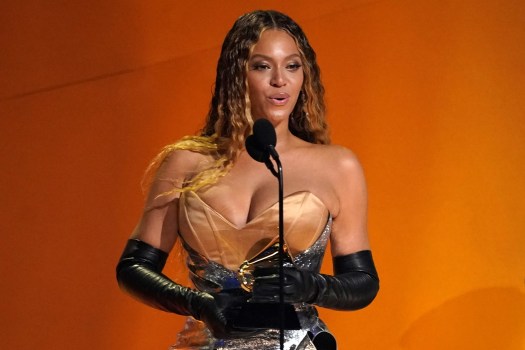
Beyoncé‘s mother, Tina Knowles, this week hit out at “racists,” “losers” and “self-haters” who accused the singer of lightening her skin for her appearance at the premiere of her new concert film.
On Instagram, Tina Knowles said the accusations were “ignorant, self-hating, racist,” after social media users questioned her daughter’s look at the premiere Saturday for “Renaissance: A Film By Beyoncé.” The star-studded event in Beverly Hills saw the mega-star wearing platinum-blonde hair and a silver-corseted dress with matching gloves. But people weren’t focused on Beyonce’s hair or dress when they asked, “Why she look so White?” or “She’s White now??” As Knowles herself shared on Instagram, people also declared, “She’s not a Black woman,” “She’s not Beyonce” and “She whitens her skin.”
Whatever was going on with Beyonce’s look at the premiere, this isn’t the first time she has been caught up in accusations that either she, or people using her image to promote a product, have appeared to make her skin look lighter. She’s also not the first celebrity of color to be caught up in a debate about colorism, which can be defined as a societal bias towards light skin.
Beyonce’s fans accused L’Oreal of “whitewashing” her when she appeared in a two-page magazine ad for its L’Oreal Paris’ Feria hair color product in 2008, The Guardian reported.
Vox also said in 2015 that the singer looked “suspiciously pale” in the album art for her 2012 album, “4,” and wrote that concerns about Black celebrities and skin lightening stem from the role that colorism and racism play in American society.
In 2011, British writer Yasmin Alibhai-Brown expressed concern to the Daily Mail when Beyonce was photographed shopping in Hollywood, with bleached-blonde hair and skin that looked much lighter than usual.
Alibhai-Brown told the Daily Mail: “Too many Black and Asian children grow up understanding the sad truth that to have dark skin is to be somehow inferior. When Black celebrities appear to deny their heritage by trying to make themselves look white, I despair for the youngsters who see those images.”
In the singer’s latest controversy, her mother insisted that her appearance at the premiere was in line with the color theme for her “Renaissance” world tour and for her film: “Silver with silver hair, a silver carpet and suggested silver attire” for attendees. Knowles despaired of the way that “bozos” on social media took her daughter’s platinum-blonde hair at the premiere to infer the she’s “bleaching her skin.” She declared in an accompanying video clip of her that she is “a browned-skin girl,” and furthermore noted the long tradition of Black female performers, such as Etta James, bleaching their hair.
But there’s also been a tradition of the media showing a preference for certain looks, including notable situations when publications have been accused of lightning the skin color of Black celebrities on their covers. People magazine faced backlash when it was accused of altering the complexion of Oscar-winner Lupita Nyong’o when it named her the most beautiful woman of 2014, Vox reported.

In 2015, Kerry Washington spoke out after InStyle magazine was accused of making her skin look lighter for a cover photo, E! News reported. The fashion magazine denied that it had digitally altered Washington’s skin tone, saying in a statement that “our cover lighting has likely contributed to this concern.”
On what was then Twitter, Washington thanked InStyle for its “beautiful statement” and for engaging in the conversation. “It’s (one) that needs to be had,” Washington said.
Viola Davis addressed the issue of colorism when she accepted a SAG Award in 2015, after New York Times TV critic Alessandra Stanley controversially suggested that she was “less classically beautiful” than Kerry Washington in a 2014 piece that was widely seen as commentary related to Davis’ skin tone, Vox and Us Weekly reported. Davis thanked the writers and directors of her show, “How to Get Away With Murder” for creating her character, law professor Annalise Keating, and for “thinking that a sexualized, messy, mysterious woman could be a 49-year-old, dark-skinned African-American woman who looks like me.”
